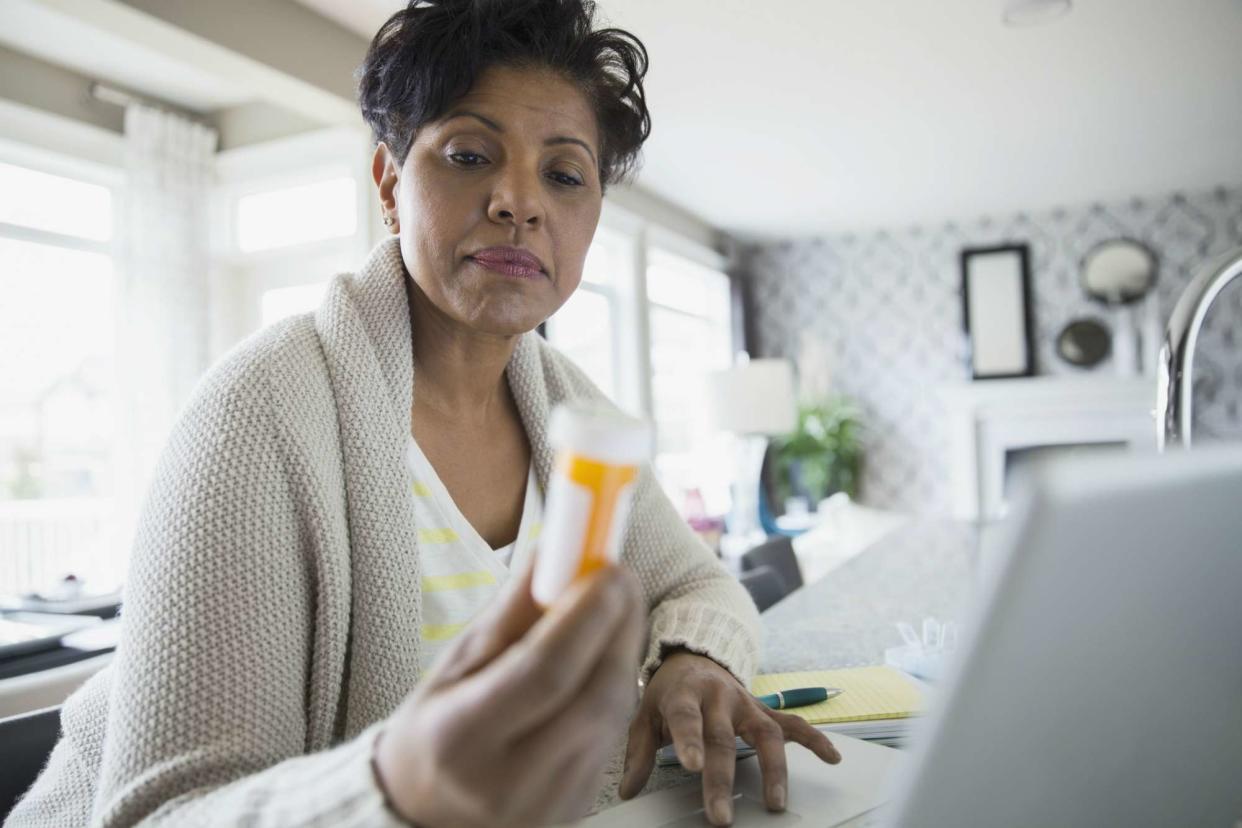4 Types of Commonly Abused Medications

Hero Images / Getty Images
Medically reviewed by Steven Gans, MD
When prescription or over-the-counter medications are used improperly, they can produce serious adverse health effects. In some cases, this can include addiction, dependence, overdose, and death.
According to the Centers for Disease Control and Prevention (CDC), the number of people who have become addicted to prescription drugs in the United States has risen to epidemic levels. According to the Centers for Disease Control and Prevention (CDC), deaths from prescription opioids have risen over the past two decades. In 2021, 16,706 people died from overdoses involving prescription opioids.
While the risk is higher if a person takes a medication in higher doses or longer periods, a person can still become dependent on medication even when taken as prescribed.
The Most Commonly Abused Drugs
Which medications are causing an increase in addiction and overdose deaths? Many medications carry the potential for abuse, but the most commonly abused drugs in the United States include:
Opioids
Stimulants
Depressants (sedatives)
Dextromethorphan
Opioids
Opioids are natural and synthetic compounds that are prescribed mostly for the relief of pain. If taken exactly as prescribed, they can be safe and effective for managing pain in patients with injuries, those who are recovering from surgery, or people with chronic pain.
Painkillers such as hydrocodone (Vicodin), oxycodone (Percocet), morphine, fentanyl, and codeine are the most abused prescription drugs in the U.S.
Opioid abuse is extremely dangerous and can lead to overdose or death.
The life-threatening consequences of opioids may be increased when they are mixed with other substances. For example, opiates should never be taken with alcohol, antihistamines, barbiturates, or benzodiazepines.
Related: Opioid Overdose: What Everyone Should Know
Stimulants
Stimulants, such as Adderall, Dexedrine, and Ritalin, are usually prescribed to increase alertness, attention, and energy. Stimulants are mainly prescribed for treating ADHD and sleep disorders, and to augment antidepressants.
Originally, physicians prescribed stimulants to treat a variety of medical conditions, but their use was greatly curtailed as the potential for abuse and addiction became better known.
There are several medical dangers associated with stimulant misuse, which are primarily related to the cardiovascular system. Rapid or irregular heartbeat, high blood pressure, and heart damage or failure are just a few examples. Misusing stimulants can also have serious psychiatric consequences.
Stimulants are more dangerous when combined with other prescriptions, such as certain antidepressants.
Over-the-counter medications also pose a risk if they are taken at the same time as stimulants—especially cold medicines containing decongestants. This can lead to dangerously high blood pressure and an irregular heartbeat.
If you are taking a stimulant medication, talk to your doctor before taking another medicine or supplement to avoid potentially dangerous drug interactions.
Related: How Stimulants Work
Depressants
Another group of medications that may lead to dependence or overdose is sedative-hypnotics; primarily barbiturates and benzodiazepines.
Barbiturates, such as Mebaral and Nembutal. This category of medications is used as anesthetics, anti-seizure medications, and was previously used for anxiety and sleep. Given the potential risks of dependency and overdose associated with these drugs, however, their use in sleep and anxiety has generally been supplanted by benzodiazepines.
Benzodiazepines, such as Valium, Xanax, and Klonopin, are used to treat anxiety, seizures, and sleep. A particular danger of benzodiazepines is when they are taken along with other drugs that can cause drowsiness, including alcohol, prescription pain medications, or some over-the-counter cold and allergy medications.
An overdose of these sedatives can cause unconsciousness, respiratory failure, and death. If you suspect that someone has overdosed on these medications, call 911 immediately.
Related: Why Combining Drugs Increases Sedative Overdose Risk
Dextromethorphan (DXM)
One of the most commonly misused over-the-counter drugs is cough syrup and caplets containing dextromethorphan (DXM). Used as directed, these cough remedies are safe and effective, but they also have the potential for misuse
When a person takes too much DXM, it can produce mind-altering effects similar to those produced by ketamine and PCP because it affects similar regions of the brain. However, taking too much of this medication can also lead to rapid heart rate, high blood pressure, impaired motor function, and severe respiratory depression.
If you are taking cold medications containing dextromethorphan, be sure to only take the manufacturer's recommended dose. You should also talk to your doctor about potential drug interactions if you are currently taking other medications. Do not combine cold medicines that contain DXM with alcohol.
How to Get Help
If you think you might have developed a dependence or addiction to prescription medication, talk to your doctor. Effective treatments are available, and your doctor can recommend the approach that will be best for your unique situation.
Do not suddenly stop taking your medication without talking to your doctor. Abruptly stopping your medication can lead to withdrawal symptoms. In some cases, such as with barbiturates and benzodiazepines, withdrawal can be life-threatening.
When stopping your medication, your doctor may recommend gradually tapering your dose over several weeks to minimize withdrawal complications. If you've been taking a short-acting medication, they may consider switching you to a longer-acting medicine to make withdrawal easier.
Once you are no longer taking the medication, several treatments and self-help strategies can help you maintain long-term abstinence. Psychotherapy can be helpful, including cognitive-behavioral therapy (CBT) and motivational enhancement therapy (MET). Joining a support group or 12-step recovery program can also be a great way to connect with people who can encourage and support you on your journey toward recovery.
If you or a loved one are struggling with substance use or addiction, contact the Substance Abuse and Mental Health Services Administration (SAMHSA) National Helpline at 1-800-662-4357 for information on support and treatment facilities in your area. For more mental health resources, see our National Helpline Database.

